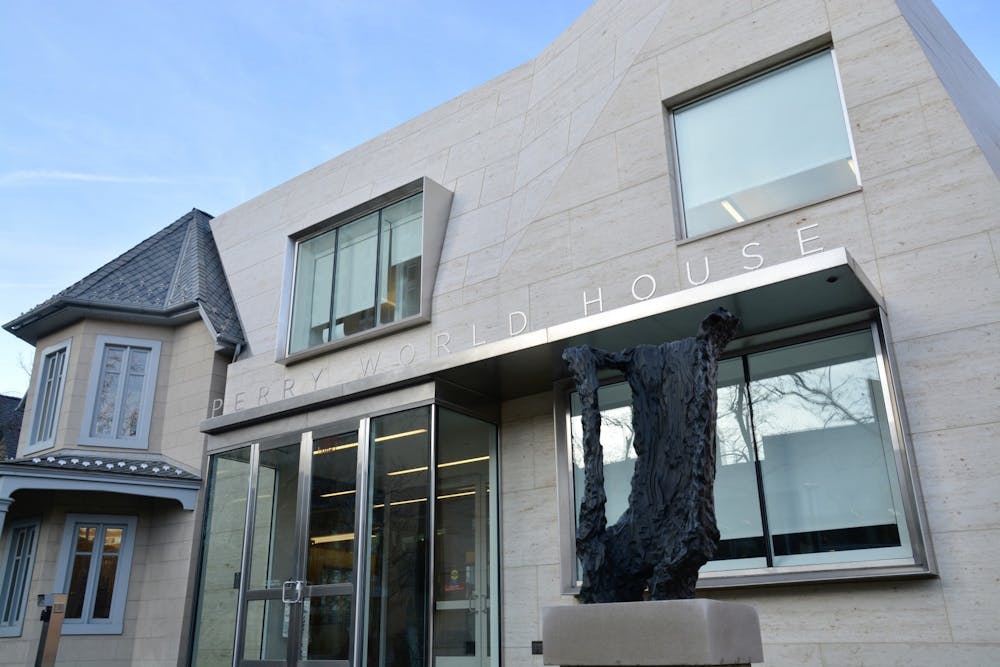
Bush found that election interference is often viewed as positive in an authoritarian regime, but negative when it impacts a democracy.
Credit: Kylie CooperFour years since Russian meddling in the 2016 United States presidential election dominated the media narrative, Perry World House Lightning Scholar Sarah Bush presented her research on why trust in government is declining globally on Tuesday.
Bush said she designed a series of surveys on the elections held in Tunisia in 2014, the U.S. in 2016 and 2018, and Georgia in 2018 to gauge how foreign election interference can influence trust in election results. She said she found that election interference is often viewed as positive in an authoritarian regime, but is generally seen as negative when it impacts a democracy.
“In these cases, we’ve been doing multiple surveys where we interview the same people repeatedly over time and try to see how their opinions about elections change,” Bush said.
She asked U.S. citizens questions about how much foreign influence they think is taking place in their elections and whether they perceive the influence as positive, negative, or a combination of the two. Bush said she conducted two waves of experiments, administering an online survey to 2,000 people in 2018.
The first wave was conducted before the 2018 midterm elections and the second was given immediately afterward, Bush said. In both waves of surveys, the participants were asked different questions about election credibility and whether or not they trusted the midterm election results. Bush then compared the participants' answers.
The second wave consisted of three different groups of people who were given different information about election interference. The first group was given widespread evidence of Russian meddling and the second was presented with information showing diminished evidence of Russian meddling. The third group was the control group and was not given any information.
Bush said the survey results showed the second group, which was given limited evidence of Russian election interference, was found to have increased trust in the election results by 60% compared to the survey conducted prior to the election.
She said a surprising key finding was that some people under authoritarian regimes view foreign influence to be positive. If a foreign entity is suspected of observational influence in an authoritarian regime’s election, she said, then the people may perceive the additional outside accountability as positive. However, foreign meddling in a democratic election is typically perceived as negative, as was the case with the 2016 U.S. presidential election, she said.
“The fact that citizens can be tolerant of foreign influences, especially when they perceive them to be benefiting their own party, offers an explanation for why we may not see very strong policy responses to try and combat and prevent and punish countries for meddling,” Bush said.
Conversely, foreign influencers that are distrusted decrease confidence in election results, which Bush said can limit voter turnout and participation in government.
“If we think that part of the point of meddling is to cause people to lose trust in democratic institutions, it probably can kind of work under the right conditions,” Bush said.
The talk was held as one of Perry World House’s weekly "The World Today" discussions in the Global Policy Lab. The room was full with attendees, with some lining the stairs because of overflow.
Tala Fakhoury, an Engineering graduate student, asked Bush about how media bias might influence the results. Bush responded that the randomization of the questions limited the impact of biases.
Bush is an associate professor of political science at Yale University as well as a Research Fellow at Yale's MacMillan Center for International and Area Studies. She is the author of "The Taming of Democracy Assistance: Why Democracy Promotion Does Not Confront Dictators" and is currently writing a book based off of her research she is conducting at Perry World House.
The Daily Pennsylvanian is an independent, student-run newspaper. Please consider making a donation to support the coverage that shapes the University. Your generosity ensures a future of strong journalism at Penn.
Donate







